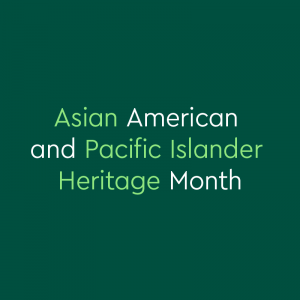Historical & Current Events dictionary
Asian American and Pacific Islander Heritage Month
[ ey-zhuhn-uh-mer-i-kuhn n puh-sif-ik ahy-luhn-der her-i-tij muhnth ]
What is Asian American and Pacific Islander Heritage Month?
Asian American and Pacific Islander Heritage Month is a month-long observance dedicated to recognizing and celebrating the contributions of Pacific Islanders and Asian Americans to the history and culture of the United States.
The term Asian American and Pacific Islander (sometimes abbreviated as AAPI) encompasses a diverse group of identities, including people with a heritage rooted in all Pacific Islands and all parts of Asia, including South and Southeast Asia. The term Asian American refers to a US citizen or resident of Asian birth or descent. The term Pacific Islander is used (including by the US Census Bureau and other organizations) to refer to people who were born on an island in the Pacific Ocean or trace their heritage to one. Examples of Pacific Islanders include Native Hawaiians and people of Samoan or Tongan descent.
The month is often observed with educational and cultural events. It is sometimes also called Asian American, Native Hawaiian, and Pacific Islander Heritage Month or Asian/Pacific American Heritage Month.
🗓 When is Asian American and Pacific Islander Heritage Month?
Asian American and Pacific Islander Heritage Month is observed during May each year.
When is Asian American and Pacific Islander Heritage Month?
Asian American and Pacific Islander Heritage Month is observed during May each year.
Where does Asian American and Pacific Islander Heritage Month come from?

Asian American and Pacific Islander Heritage Month originated as Asian/Pacific American Heritage Week, which was officially established on a national level in 1978. US presidents continued to issue proclamations setting the dates for the week each year until 1990, when the observance was expanded to a month. In 1992, Congress passed a law permanently designating May as Asian American and Pacific Islander Heritage Month.
The month of May was chosen due to its connection to a few significant events in the history of Asian Americans in the US. Many of the first Japanese immigrants arrived in the US in May 1843, and the transcontinental railroad was completed in May 1869, largely through the labor of Chinese immigrants. These Chinese workers were often exploited and faced discrimination before and after the construction of the railroad, which is just one prominent example of the racism Asian Americans have faced throughout the history of the US.
Due to this history, Asian American and Pacific Islander Heritage Month also often serves as a time to reflect on, raise awareness of, and work to address and dismantle the racism that Asian Americans and Pacific Islanders face and have faced.
While the designation Asian American and Pacific Islander and its abbreviation, AAPI, are becoming a more common way for people to identify as part of that community, not everyone uses these terms. Some prefer to use more specific terms, and some Pacific Islanders have called for the separation of the terms to avoid erasing or overshadowing specific issues and forms of racism and colonialism that affect Pacific Islander communities.
Examples of Asian American and Pacific Islander Heritage Month
Who uses Asian American and Pacific Islander Heritage Month?
Did you know … ?
- The first Pacific Islander elected to Congress was Robert W. Wilcox of Hawaii, a Native Hawaiian who advocated for Hawaiian independence.
- Astronaut Ellison Onizuka became the first Asian American in space in 1985.
What are other words used in discussion of Asian American and Pacific Islander Heritage Month?
Note
This is not meant to be a formal definition of Asian American and Pacific Islander Heritage Month like most terms we define on Dictionary.com, but is rather an informal word summary that hopefully touches upon the key aspects of the meaning and usage of Asian American and Pacific Islander Heritage Month that will help our users expand their word mastery.